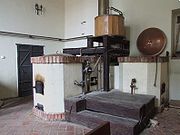
Beerhouse Act
Encyclopedia

Brewing
Brewing is the production of beer through steeping a starch source in water and then fermenting with yeast. Brewing has taken place since around the 6th millennium BCE, and archeological evidence suggests that this technique was used in ancient Egypt...
and sale of beer
Beer
Beer is the world's most widely consumed andprobably oldest alcoholic beverage; it is the third most popular drink overall, after water and tea. It is produced by the brewing and fermentation of sugars, mainly derived from malted cereal grains, most commonly malted barley and malted wheat...
. It was modified by subsequent legislation and finally repealed in 1993.
The precursor to the Beerhouse Act was the Alehouse Act 1828 (9 Geo.4 c.61), which established a General Annual Licensing Meeting to be held in every city, town, division, county and riding, for the purposes of granting licences to inns, alehouses and victualling houses to sell exciseable liquors to be drunk on the premises.
Enacted two years later, the Beerhouse Act enabled anyone to brew and sell beer on payment of a licence costing two guinea
Guinea (British coin)
The guinea is a coin that was minted in the Kingdom of England and later in the Kingdom of Great Britain and the United Kingdom between 1663 and 1813...
s, or £2.10 in modern currency. The intention was to increase competition between brewers, and it resulted in the opening of hundreds of new beerhouse
Beerhouse
A beerhouse was a type of drinking establishment created in the United Kingdom by the 1830 Beerhouse Act, legally defined as a place "where beer is sold to be consumed on the premises". Public houses at the time were issued with licences by local magistrates under the terms of the Retail Brewers...
s, public houses and breweries throughout the country, particularly in the rapidly expanding industrial centres of the north of England. According to the Act itself, the Parliament
Parliament of the United Kingdom
The Parliament of the United Kingdom of Great Britain and Northern Ireland is the supreme legislative body in the United Kingdom, British Crown dependencies and British overseas territories, located in London...
considered it was "expedient for the better supplying the public with Beer in England, to give greater facilities for the sale thereof, than was then afforded by licences to keepers of Inns, Alehouses, and Victualling Houses."
The Act's supporters hoped that by increasing competition in the brewing and sale of beer, and thus lowering its price, the population might be weaned off more alcoholic drinks such as gin
Gin
Gin is a spirit which derives its predominant flavour from juniper berries . Although several different styles of gin have existed since its origins, it is broadly differentiated into two basic legal categories...
. But it proved to be controversial, removing as it did the monopoly of local magistrates to lucratively regulate local trade in alcohol, and not applying retrospectively to those who already ran public houses. It was also denounced as promoting drunkenness.
By 1841 licences under the new law had been issued to 45,500 commercial brewers. One factor in the Act was the dismantling provisions for detailed recording of licences, which were restored by subsequent regulatory legislation: the Wine and Beerhouse Act 1869 and the Wine and Beerhouse Act Amendment Act 1870. The Bill itself was often amended, notably in 1834 and 1840.
The final remaining provisions of the Act were repealed by Parliament
Parliament of the United Kingdom
The Parliament of the United Kingdom of Great Britain and Northern Ireland is the supreme legislative body in the United Kingdom, British Crown dependencies and British overseas territories, located in London...
on 11 November 1993, by the Statute Law (Repeals) Act 1993 (1993 c. 50), s. 1(1), Sch. 1 Pt. XIII GroupI. The passage of the Act during the reign of King William IV
William IV of the United Kingdom
William IV was King of the United Kingdom of Great Britain and Ireland and of Hanover from 26 June 1830 until his death...
led to many taverns and public houses being named in his honour; he remains "the most popular monarch among pub names".

